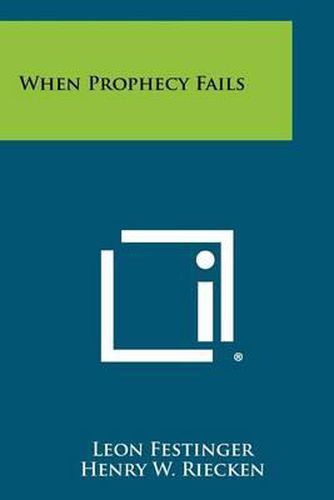Readings Newsletter
Become a Readings Member to make your shopping experience even easier.
Sign in or sign up for free!
You’re not far away from qualifying for FREE standard shipping within Australia
You’ve qualified for FREE standard shipping within Australia
The cart is loading…






2012 reprint of 1956 First edition. Full facsimile of the original edition, not reproduced with Optical Recognition Software. When Prophecy Fails [1956] is a classic text in social psychology authored by Leon Festinger, Henry Riecken, and Stanley Schachter. It chronicles the experience of a UFO cult that believed the end of the world was at hand. In effect, it is a social and psychological study of a modern group that predicted the destruction of the world, and the adjustments made when the prediction failed to materialize. The authors have done something as laudable as it is unusual for social psychologists. They espied a fleeting social movement important to a line of research they were interested in and took after it. They recruited a team of observers, joined the movement, and watched it from within under great difficulties until its crisis came and went. Their report is of interest as much for the method as for the substance. -Everett C. Hughes, The American Journal of Sociology.
$9.00 standard shipping within Australia
FREE standard shipping within Australia for orders over $100.00
Express & International shipping calculated at checkout
2012 reprint of 1956 First edition. Full facsimile of the original edition, not reproduced with Optical Recognition Software. When Prophecy Fails [1956] is a classic text in social psychology authored by Leon Festinger, Henry Riecken, and Stanley Schachter. It chronicles the experience of a UFO cult that believed the end of the world was at hand. In effect, it is a social and psychological study of a modern group that predicted the destruction of the world, and the adjustments made when the prediction failed to materialize. The authors have done something as laudable as it is unusual for social psychologists. They espied a fleeting social movement important to a line of research they were interested in and took after it. They recruited a team of observers, joined the movement, and watched it from within under great difficulties until its crisis came and went. Their report is of interest as much for the method as for the substance. -Everett C. Hughes, The American Journal of Sociology.